The papers of the Lothian Surgical Audit (LSA) have now been catalogued as part of our Wellcome Trust funded project and the catalogue is available to view here on the Archives Hub (with an abridged version available on our website here). The archive presents an untapped and unique resource. The story of LSA is a fascinating one (currently unexplored by historians), illustrating how a group of local surgeons used audit to influence and improve surgical care.
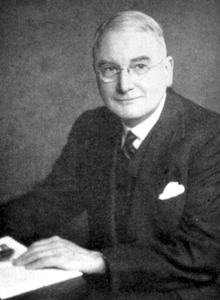 Professor Sir James Learmouth
Professor Sir James Learmouth
LSA represents the earliest example in the United Kingdom of systematic surgical audit and has its origins in the Saturday Morning Meetings inaugurated by Professor Sir James Learmonth (1895-1967) in 1946. At the close of the Second World War, Learmonth was concerned with demobilised soldiers returning to Edinburgh, who, despite having gained significant practice in battlefield injuries, had little experience in civilian surgery, and importantly, no exposure to academic discipline and standards. It was against this backdrop and his desire to promote higher standards of surgical practice, that he initiated closed-session meetings in his Edinburgh University Department of Clinical Surgery based in wards 7/8 of the Royal Infirmary.[i] For Learmonth, the principle behind the meetings was that ‘any death following surgery should be discussed amongst colleagues in a constructively critical manner’.[ii] Learmonth extended the meetings to include all surgical units in the Royal Infirmary of Edinburgh and those in other hospitals in the Lothians. Initial participants were those representing ‘core’ general surgery units which took part in the Edinburgh emergency receiving rota, the units of the Eastern General Hospital, Leith Hospital and Western General Hospital (WGH) together with Bangour General Hospital. Other contributors were units at Bruntsfield, Deaconness and Longmore (the Southern Group), with Chalmers Hospital presenting jointly with the unit based at wards 15/16 of the Royal Infirmary with which it was linked. As the Saturday Morning Meetings progressed, developments saw the net being cast more widely, with the addition of specialities at the meetings, including Diagnostic Radiology, Combined medical-surgical Gastro-intestinal unit (WGH), Orthopaedics, Neurosurgery, Paediatrics, Plastic Surgery, Radiotherapy, Cardio-thoracic Surgery, Urological Surgery and latterly Liver Transplant.
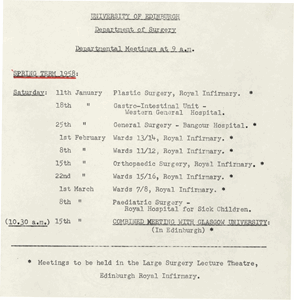 Department of Surgery, Saturday Morning Meeting Programme, Spring Term 1958 (LSA 2/1/2/2)
Department of Surgery, Saturday Morning Meeting Programme, Spring Term 1958 (LSA 2/1/2/2)
The Saturday Morning Meetings essentially provided an opportunity for junior and senior surgeons to assemble once a week for discussion and scrutiny of those units presenting data and reports on mortality that week. The first half of the meeting was devoted to research presentations, usually given by a trainee surgeon in order to foster research. Each participating unit would prepare a handout in advance of the meeting showing their statistics for the year. Statistical returns would include the number and type of operations and the number of deaths, and a detailed list of all deaths in the unit, with patient identifiers removed. In presenting these a few were selected where death was unexpected or where different decisions might have prevented a fatal outcome.
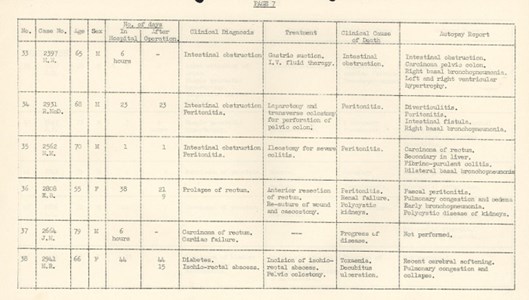 Wards 13/14, Royal Infirmary of Edinburgh, 17 JUNE 1959 (LSA 2/2/2/1)
Wards 13/14, Royal Infirmary of Edinburgh, 17 JUNE 1959 (LSA 2/2/2/1)
Combined meetings with Glasgow surgeons were occasionally held, and it would appear these were organised around the rugby fixtures at Murrayfield.
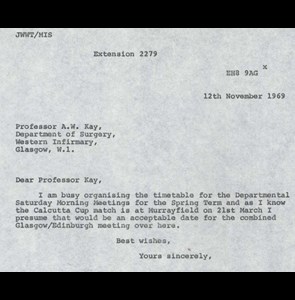 LSA 2/4/1
LSA 2/4/1
From the outset, the nature of the meetings was very much ‘behind closed doors’, and the open accountability that took place inside the meeting understandably made the experience uncomfortable for many; in 1996, retired consultant surgeon A. A. “Tony” Gunn recalled:
'The Saturday Morning Meetings of Edinburgh surgeons…terrified some, stimulated many and trained all who attended.’
Importantly, the surgeons themselves were careful to take ownership of the Audit, (although latterly ownership was controversially taken over by Government). The development of innovative computer packages designed for surgical audit were fundamental to the success of LSA, and enabled surgeons to move beyond the emphasis on mortality, and address morbidity and other more varied facets of surgical practice. For instance, work statistics gathered were used to help administrative policies with particular respect to consultant workloads. Trends were more efficiently evaluated, prompting major changes in the practice of surgery. For example, high dependency units were introduced in light of the evidence from the Saturday Morning Meetings annual reports. Advances in the specialisation of vascular surgery was a further consequence, with LSA highlighting that patients with ruptured abdominal aortic aneurysms under the care of general surgeons showed a twice greater rate of mortality than those admitted to general surgeons. The purpose of LSA was ultimately to promote surgical excellence. In 1989, a Government White paper lauded the success of the Lothian Surgical Audit in its paper ‘Working with Patients’, and its principles were used as an illustration and proposed model for future clinical audits. For instance, by 1994 the Scottish Audit of Surgical Mortality (SASM) was firmly in place in Lothian and the South East, and this became a national audit (LSA had essentially evolved into SASM). SASM was adopted and modified in Perth, Australia. The names of RCSEd Fellows appear throughout the history of the Lothian Surgical Audit. In 1996, the 50th Anniversary was celebrated with a Symposium, during which, Steve Nixon reflected:
'Could Sir James Learmonth ever have dreamed that his simple concept of peer review, mortality audit in the Royal Infirmary Edinburgh would spread across the length and breadth of Scotland to involve every single surgical hospital and every surgical speciality?' [iii]
* Grateful thanks are extended to Mr. Iain Macintyre for sharing his memories of the Saturday Morning Meetings. References:
[i] Iain Macintyre, ’50 Years of Surgical Audit in Lothian’, in, M. M. Stewart, Lothian Surgical Audit: 50th Anniversary Symposium Proceedings (Scottish Office, National Health Service in Scotland: 1996).
[ii] Steve Nixon, ‘The Development of an Operation Mortality Index on Microcomputers’, in (eds.), P. D. Coleridge Smith, J. H. Scurr, Medical Applications of Microcomputers (Springer, 1988), 44.
[iii] Ibid., 45.







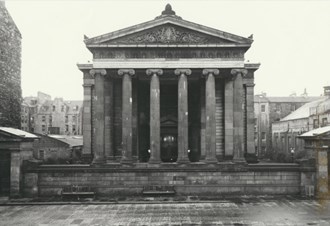
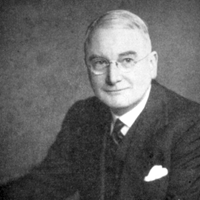 The Lothian Surgical Audit Archive
The Lothian Surgical Audit Archive